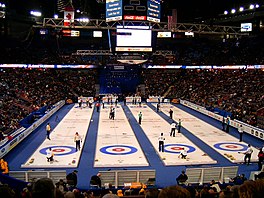Curling rink

Curling games taking place during the 2005 Tim Hortons Brier
|
|
| Highest governing body | World Curling Federation |
|---|---|
| Nicknames | Chess On Ice, The Roaring Game |
| First played | Approximately late medieval Scotland |
| Registered players | est. 1,500,000 |
| Characteristics | |
| Contact | No |
| Team members | 4 or 3 per team (2 in mixed doubles) |
| Mixed gender | Yes; see mixed curling |
| Type | Precision and accuracy |
| Equipment | Curling brooms, stones (rocks), curling shoes |
| Venue | Curling sheet |
| Presence | |
| Olympic | First event in 1924 (Retroactively made official in 2006). Demonstration sport in 1932, 1988 and 1992. Officially added in 1998. |
| Paralympic | Officially added in 2006. See Wheelchair curling |
Curling is a sport in which players slide stones on a sheet of ice towards a target area which is segmented into four concentric circles. It is related to bowls, boules and shuffleboard. Two teams, each with four players, take turns sliding heavy, polished granite stones, also called rocks, across the ice curling sheet towards the house, a circular target marked on the ice. Each team has eight stones. The purpose is to accumulate the highest score for a game; points are scored for the stones resting closest to the centre of the house at the conclusion of each end, which is completed when both teams have thrown all of their stones. A game usually consists of eight or ten ends.
The curler can induce a curved path by causing the stone to slowly turn as it slides, and the path of the rock may be further influenced by two sweepers with brooms who accompany it as it slides down the sheet, using the brooms to alter the state of the ice in front of the stone. A great deal of strategy and teamwork go into choosing the ideal path and placement of a stone for each situation, and the skills of the curlers determine how close to the desired result the stone will achieve. This gives curling its nickname of "chess on ice".
Curling was invented in medieval Scotland, with the first written reference to a contest using stones on ice coming from the records of Paisley Abbey, Renfrewshire, in February 1541. Two paintings, "Winter Landscape with a Bird Trap" and "The Hunters in the Snow" (both dated 1565) by Pieter Bruegel the Elder depict Flemish peasants curling—Scotland and the Low Countries had strong trading and cultural links during this period, which is also evident in the history of golf.
...
Wikipedia
